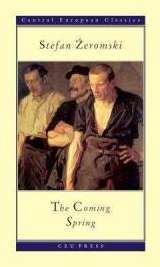The Spring to Come
The Polish novel Przedwiośnie (a title translated alternatively as First Spring,[1] Before the Spring,[2] Early Spring,[3] Springtime,[4] or Spring To Come[5]) was written by the leading Polish neoromantic writer Stefan Żeromski, and first published in 1925, the year he died.[6] The book has been translated and published in the U.S. as the Coming Spring in 2007.[7]
 | |
| Author | Stefan Żeromski |
|---|---|
| Original title | Przedwiośnie |
| Translator | Bill Johnston |
| Country | United States |
| Language | Polish |
| Genre | Novel |
| Publisher | Central European University Press |
Publication date | 1925 |
Published in English | 2007 |
| Media type | Print (Paperback) |
| ISBN | 963-7326-89-8 |
The novel consists of three parts: Szklane Domy (Glass houses), Nawłoć (Nawłoć estate), and Wiatr od wschodu (the Eastern wind). It is set between 1914–1924, before and during the reconstitution of Poland as the Second Polish Republic, including the Polish-Soviet war. As the Russian Revolution breaks out, the main character, Cezary Baryka, escapes from Baku with his father, a Polish political exile from Siberia (see also, Poles in Azerbaijan). The father dies en route to the newly formed Polish state. Cezary enters Poland alone, the country of his parents, having never been there before. The novel tells of his disillusionment as the Poland he discovers does not resemble that of which his father told him; a feeling only magnified by the Baryka's deep suspicion of the Bolshevik solutions about the poor.[7]
A live action version was released in two formats in Poland on 2 March 2001, adapted and directed by Filip Bajon, produced by Dariusz Jabłoński, and featuring Mateusz Damięcki as Cezary Baryka. A five-hour miniseries version was broadcast on Polish television, and a 138-minute cut distributed to theatres.
Notes and references
- The Review of the Polish Academy of Sciences. Volume 24. Page 10. Publisher: Polska Akademia Nauk (Polish Academy of Sciences), Zakład Narodowy Imienia Ossolińskich "Ossolineum", 1980.
- Bill Johnston, The faithful river By Stefan Żeromski. Page ix. Northwestern University Press, 1999. ISBN 0-8101-1596-4.
- Adam Michnik, Irena Grudzińska-Gross, Roman S. Czarny, In search of lost meaning: the new Eastern Europe. Page 81. University of California Press, 2011. ISBN 0-520-26923-3.
- Geert Lernout, Wim Van Mierlo, The reception of James Joyce in Europe. Page 231. Continuum International, 2004. ISBN 0-8264-5825-4.
- Marci Shore, "Caviar and ashes": a Warsaw generation's life and death in Marxism, 1918-1968. Page 26. Yale University Press, 2006. ISBN 0-300-11092-8.
- Review of Przedwiośnie with discussion on the themes of the 1925 novel and 2001 movie.
- The Coming Spring by Stefan Zeromski, translated and with an introduction by Bill Johnston, Central European University Press, Tra edition, May 2007.
- The Spring to Come on IMDb
- The Spring To Come review from The New York Times
- Full text of Przedwiośnie in the original Polish